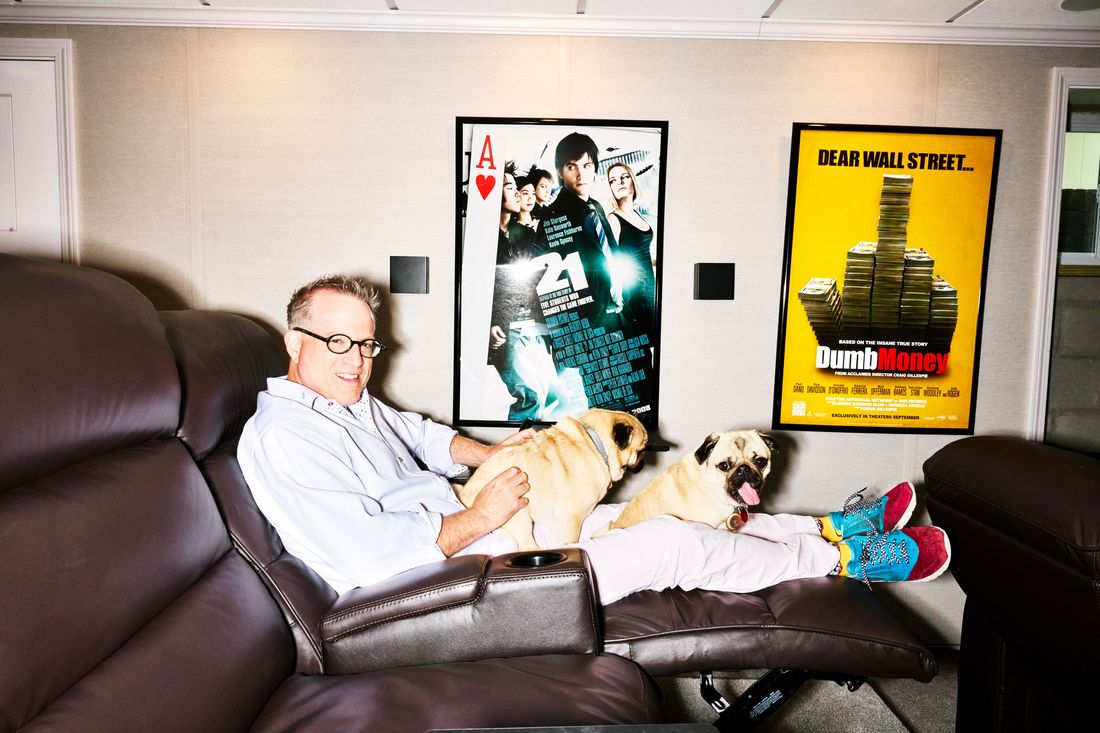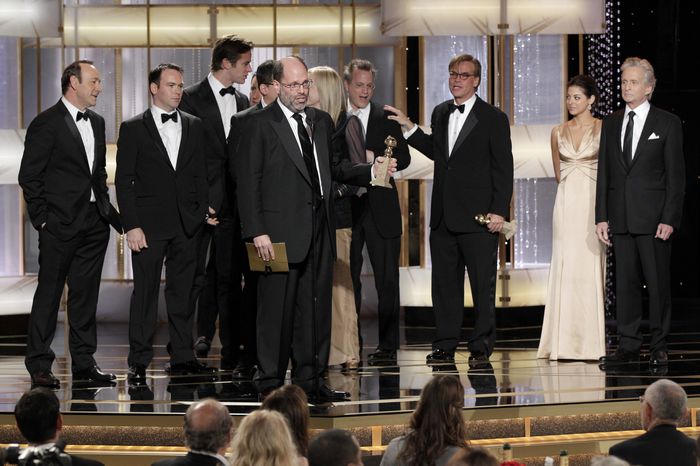How a gleefully unscrupulous hitmaker became one of the most bankable writers in the business.
Save this article to read it later.
Find this story in your accountsSaved for Latersection.

Ben Mezrich owns a magic radio.
The first thing he wished for was to meet his future wife: I asked the radio for Tonya.
I just described her exactly.

Well, not exactly, but, like, I wished for a beautiful, model-y, smart girl.
(They married in 2006.)
Mezrichs buddies started coming over to attempt to kiss the radio, but he wouldnt let them.

Next was his career.
After that happened in 2002, he had one wish left and knew just what to ask for.
He wanted a blockbuster, so he turned off the lights and asked for one.

Mezrich got his blockbuster whenBringing Down the Housebecame21,opening at No.
1 at the box office in the spring of 2008.
As Mezrichs career has progressed, so has his own genielike ability to enchant film executives.
His ability to land a commercial tone and character, OConnor says, makes him recessionproof.
And hes not wrong, by and large!
In a way, Mezrichs books arent even books.
What they really are is IP: intellectual property designed for Hollywood adaptation.
There is pearl-clutching about that notion that the published work should be an end unto itself.
Ben, smartly and rightly, was like,Nonsense.
Some of these you may not have heard of.
There isWoolly,about the race to create a genetically engineered mammoth.
Normally, a writer publishes a book or article, then tries to get Hollywood interested in adapting it.
Mezrich does it the other way around.
If Hollywood doesnt bite?
He just wont write the book, shelving the idea and coming up with another one.
(Buzz Bissinger is addicted to Gucci leather; Ben Mezrich, foot massagers.)
I was a weak, small child, a kid who couldnt play sports, Mezrich narrates, deadpan.
He revered celebrity from an early age but felt he lacked the looks or athletic talent to become famous.
I think the first novel he submitted was calledMutant Brew, Stossel says.
Mezrichs bible as a young author wasWriting the Blockbuster Novel,by veteran literary agent Albert Zuckerman.
Mezrich wrote brochures for a nonprofit while doggedly cranking out 40-odd pages a day on the side.
He wasnt discouraged by the rejection, possessing what he calls a delusion of genius.
Part of this is having a Jewish mother, he supposes.
He published his first novel,Threshold,in 1996, when he was five years out of college.
In one trade-fiction roundup, a critic wrote, This is a bad book.
Somebody should option it for the movies.
Its funny, Mezrich says.
I didnt do any drugs.
I had no vices, really, except I wanted to live extravagantly.
Stossel remembers the era vividly: He had been living hand-to-mouth, crashing with an ex-girlfriend.
I think he went into debt in one day.
Spaceys business partner Dana Brunetti christened the genre dick lit.
Just say you never talked to me!
Everyone will assume he made it up anyway.
Mezrich, in a loud bespoke dress shirt, manages simultaneously to stick out and look utterly at home.
As we talk, Michael Lewiss name comes up; they share a film agent.
I ask him how that makes him feel.
I think its hilarious, he replies.
Does he think its true?
We write very differently.
Did he open with an orgy in the Bahamas?
Because my book would have opened with a drug-fueled orgy in the Bahamas.
Mezrich set up a meeting with the friend, named Eduardo Saverin, at a hotel bar.
I remember this exactly, Mezrich says.
He drinks, like, two beers.
And he starts the conversation, and hes like, Mark Zuckerberg fucked me.
The proposal was leaked to Gawker.
(Its unclear if this timeline or its details is entirely correct.
Saverins nondisclosure agreement probably ensures well never know.)
Mezrich thinks Saverin, currently No.
56 on the Bloomberg Billionaires Index on the strength of his Facebook settlement, should send him a gift.
I dont need three months, six months with Eduardo.
Ill write a book in four weeks!
(In the end, he amends, it was more like 11 weeks.)
In any case, Mezrich already had what he needed from Saverin.
We thought of ourselves as some combination ofRevenge of the Nerdsand Statler and Waldorf.
After the proposal leaked, thenSony Pictures head Amy Pascal called Sorkin to gauge his interest in adapting it.
Sorkin had already seen it that morning and told her he was hooked after a few pages.
Mezrich sold the rights off his proposal, the first time hed done it that way.
Never seen anything like it.
(Rudin wouldnt comment.
And yet Sorkin clearly had used the book.
Afterward, Zuck goes home and cruelly blogs about her cup size.
None of it came from real life: no bar, no BU girlfriend, no LiveJournal revenge-blogging.
Hed normally be the guy behind the rope.
If that needed a follow-up, which it doesnt, his heightened version is: Billionaires.
Was it really possible?
The film and tv industry has always been interested in nonfiction adaptations.
Producers love based on a true story, and so do viewers.
In 2009, according to an analysis by the web link FX, 210 scripted shows aired.
Mezrichs Hollywood rise coincides exactly with this period of heightened demand.
There is such a reactionary and fear-based way of developing projects, says one book-to-film agent.
People need somebody else to anoint it first, to add validation to it.
People are excited by things that seem exciting, says an IP scout at one of the streamers.
He compares IP to so-called Veblen goods, intrinsically valueless luxury items that appreciate because others want them.
Journalists tend to get paid by Hollywood via an option-purchase agreement.
Thanks to the IP glut, option payments were inflating from five figures to six or more.
The boom helped Mezrich, for whom the book business had become less attractive on its own terms.
Now, the dynamic has flipped.
Sales have become an afterthought with adaptation representing the whole ball game.
By buying it and announcing it inThe Hollywood Reporter,everyone else pauses.
Do I want to buyThe Wall Street Journals reporting if Sony is already putting money into this?
This chain of events happened more or less exactly in late January 2021, when the GameStop mania began.
Shes like, I think its a movie.
Im like, I do too, he says.
First order of business: Whats the piece of IP that will help put us ahead of everyone else?
The GameStop saga spawned its own genre of articles about the sprint to turn it into a movie.
MGM bought MezrichsDumb Moneybook proposal outright for more than $1 million.
And in the end, only his feature got made.
The book itself is a template for the actual screenwriter.
In retrospect, the GameStop free-for-all may have represented the peak of the easy-money IP boom.
Netflixs competitors realized they couldnt compete with the industry leader and scaled back development.
As TV production has fallen from its 2022 peak, so has Hollywoods interest in spraying money at journalists.
If anything, what Hollywood craves now isnt fresh ideas but reliable IP from proven commodities.
And lately he has streamlined his system.
Once upon a time, he hunted down little-known yarns, like Saverins.
(I would really love for it to turn intoThe Da Vinci Code, he said.
It came out in October.)
He started brainstorming what to do next.
True crime is superhot right now, but Im not really a crime writer.
And then I was like,Am I going to write the AI thing?
He consulted Google: I Googled scams.
This is the worst, right?
He didnt see anything he loved.
The upset was so spectacular that Carlsen intimated Niemann was cheating, causing a meltdown in the sport.
Mezrich vaguely remembered the story, but he couldnt recall how it was resolved, if at all.
He took a couple days to bang out hisCheckmateproposal, which clocked in at 15 pages.
When theCheckmateproposal started circulating, not everyone in Hollywood saw the appeal.
It was so thin.
I was like,What is this?
Someone who works in adaptations at a streamer remembers when it landed in his inbox.
It doesnt tell you anything you couldnt get from any other place, he says.
Of course, it wound up doing just that.
Hes doing these land grabs.
The journalist says, Hes not even finding anything!
Like,Oh, Ben Mezrich yes, I know what that means.
Its kind of incredible.
Hes, like, post-IP.
Whatever happened, it would make for a perfect ending to his book.
He and Tonya begin discussing hotel accommodations in Paris.
He goes further, wondering if he is, in fact, dreaming the world into being.
Deep down, I think Im probably creating the simulation.
Which is, of course, another way to describe his approach to nonfiction.
Looking back, Maslin feels Mezrich was a harbinger of the post-truth paradigm.
I couldnt have known he would become more of the norm.
For a journalist, the lure of fact-checking Mezrichs books is irresistible.
I did it myself by calling Mezrichs sources.
In fact, Mezrich invented the date completely.
But I only learned this because Jeremy Poe is a real, findable person named Noah Lanier.
Mezrichs methods have created a Boy Who Cried Wolf dynamic.
And each came to Mezrich with their stories after learning that he was working on a book.
Mezrich talks like he writes: Everything is a little exaggerated.
But theres a way in which Mezrichs cinematic approach to the world can yield results that feel cosmically true.
I think the movie got it exactly right, Mezrich says.
I dont think Mezrich can win the holier-than-thou game.
I tell her I probably cant.
You chose Quechee over Paris, Mezrich informs me.
it’s possible for you to still write it!
See, thats what I would do.
Thank you for subscribing and supporting our journalism.